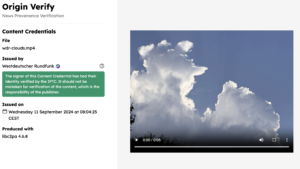Categories
Archives

In October 2024, 70 people representing 30 organisations from 15 countries across four continents gathered at the BBC building in Salford to join the Origin Media Provenance Seminar. The seminar was organised by BBC R&D with partners from Media Cluster Norway (MCN) in Bergen.
Media provenance is a way to record digitally signed information about the provenance of imagery, video and audio – information (or signals) that shows where a piece of media has come from and how it’s been edited. Like an audit trail or a history, these signals are called ‘content credentials’, and are developed as an open standard by the C2PA (Coalition for Content Provenance and Authenticity). Content credentials have just been selected by Time magazine as one of their ‘Best Inventions of 2024’.
Attendees came from all over the world, including the US, Japan, all over Europe, and also sub-Saharan Africa.
According to the BBC blog post:
In order for news organisations to show their consumers that they really are looking at some content from the real “BBC”, content credentials use the same technology as websites – digital certificates – to prove who signed it. The International Press Telecommunications Council (IPTC) has created a programme called “Origin Verified News Publishers”, which allows news organisations to register to get their identity checked. Once their ID has been verified, they can get a certificate, which gives consumers assurance that the content certifiably comes from the organisation they have chosen to trust.
For more information about the event, see the blog post on the BBC Research & Development blog.
For more information about the IPTC Origin Verified News Publishers List, please see the Media Provenance section of the IPTC website or contact the IPTC directly.

AMSTERDAM, 13 September 2024 — The International Press Telecommunications Council (IPTC) has announced Phase 1 of the IPTC Verified News Publishers List at the International Broadcast Convention (IBC).
The list uses C2PA technology to enable verified provenance for the news media industry. News outlets apply for a certificate from a partner Certificate Authority (currently Truepic), with the IPTC verifying the identity of the publisher. The certificate is then used by the news outlet to sign content, in accordance with the C2PA specification’s handling of “additional trust anchor stores”. This means that the news publisher is the signer of the content. This is a key requirement for many media outlets.
Currently the BBC (UK), CBC / Radio Canada (Canada) and broadcaster WDR (Germany) have certificates on the Verified News Publishers List. Many more publishers and broadcasters are currently in the process of obtaining a certificate. To register your interest as a news publisher, please fill out the Verified News Publisher expression of interest form.
To make the process of verifying and approving certificate requests transparent and accountable, the IPTC has released a set of policies for issuing Verified News Publisher certificates covering Phase 1 of the project. The process includes a “fast track” process for media organisations that are already well known to IPTC, and also a self-certification track. The policies were approved by the IPTC membership at a recent meeting of the IPTC Media Provenance Committee.
Verifying publisher identity, not trustworthiness
Note: as we have always made clear, the IPTC is making no claims about the truth or trustworthiness of content published by news publishers on the IPTC Verified News Publisher List. We simply verify that the publisher is “who they say they are”, and then the signature will verify that the content was published by that publisher, and has not been tampered with since the point of publishing.
We make it clear in the governance policies that a certificate can be revoked if the certificate’s private key has been compromised in some way, but we will not revoke certificates for editorial reasons.
Online verifier tool
The IPTC has worked with the BBC to launch a simple Verified News Publisher content verifier tool hosted at https://originverify.iptc.org. The tool displays a special indicator when content has been signed by an organisation whose certificate is on the Verified News Publisher list. The IPTC has also published a set of Verified News Publisher sample content that can be used with the verifier to demonstrate the process in action.
Sharing best practices, resources and knowledge among news publishers
For IPTC members, the Media Provenance Committee has created an internal members-only wiki detailing best practices and lessons learned while implementing C2PA and the Verified News Publisher List at broadcasters and publishers. Information on the wiki includes technical details on how to generate a certificate signing request to obtain a certificate, how to sign content with open-source and commercial tools, how to deal with publishing and distribution technology such as streaming servers and content delivery networks, and how to add metadata to C2PA assertions embedded in media content.
The Committee has also created a public-facing area of the IPTC site describing IPTC’s work in the area of Media Provenance, helping news publishers to get up to speed and understand how C2PA technology works and how it can be implemented in publishing workflows.
Other IPTC and Media Provenance-related events at IBC this weekend:
- Judy Parnall (BBC), Lead of the IPTC Media Provenance Advocacy Working Group, spoke on a panel on “Content Tracing and Provenance” this morning (Friday) at the AI Zone.
- Judy is also presenting a paper at the IBC Conference on Saturday 14 September: Provenance: What can we Trust?, along with IPTC Individual Member John Simmons.
- Combating disinformation in News: A critical year for democracies at the IPTC Conference on Saturday. Laura Ellis (BBC) is on the panel along with representatives from CBS and GLOBO.
- On Sunday 15 September, Judy presents IBC’s Accelerator Project “Design Your Weapons in Fight Against Disinformation” on the IBC Innovation Stage, along with tech leaders from CBS, Associated Press and ITN.

The IPTC’s Managing Director, Brendan Quinn, has written an article for the latest edition of the European Broadcasting Union’s technical magazine, EBU tech-i.
In the article, Brendan promotes the IPTC’s work in Media Provenance, including the founding of the IPTC Media Provenance Committee.
Brendan’s article can be found on page 17 of the PDF or print copy or the magazine.
The issue also contains a piece by Judy Parnall of the BBC, current Chair of the Committee, also covering C2PA and our joint work on media provenance.
The issue also contains interesting insights from European broadcasters on AI in media production, innovating to meet the challenges of covering the Paris 2024 Olympics, the creation of an Enterprise Architecture working group within the EBU membership, cybersecurity for media outlets, the future of broadcast radio in a world connected cars, and more.

The International Press Telecommunications Council, in conjunction with Project Origin, has established a working group to create and manage a C2PA compatible list of verified news publishers.
The open C2PA 2.0 Content Credentials standard for media provenance is widely supported as a strong defence against misinformation. Recent announcements by OpenAI, Meta, Google and others have confirmed the value of an interoperable, tamper-evident way of confirming the source and technical integrity of digital media content.
Project Origin, as a co-founder of the C2PA, has brought the needs of the news publishing community to the forefront of the creation of this standard. This now includes the creation of a C2PA 2.0 compatible Origin Verified Publisher Certificate to be used by publishers to securely create a cryptographic seal on their content. The signing certificates will be available through the IPTC, who will work with C2PA validators to gain widespread acceptance. These signing certificates will be issued by the IPTC to broadcast, print and digital native media publishers.
Origin Verified Publisher Certificates will ensure that the identity of established news organisations are protected from imposters. The certificates confirm organisational identity and do not make any judgement on editorial position. Liaison agreements with other groups in the media ecosystem will be used to accelerate the distribution of certificates.
The initial implementation uses TruePic as a certificate authority, with the BBC and CBC/Radio-Canada as trial participants.
“As a founding partner of Project Origin, CBC/Radio-Canada is proud to be one of the first media organisations to trial Origin Verified Publisher Certificates,” said Claude Galipeau, Executive Vice-President, Corporate Development, CBC/Radio-Canada. “This initiative will provide our audiences with a new and easy way of confirming that the content they’re consuming is legitimately from Canada’s national public broadcaster. It’s an important step in our adoption of the Content Credentials standard and in our fight against misinformation and disinformation.”
Jatin Aythora, Director of BBC R&D, and vice chair for Partnership on AI, said “Media provenance increases trust and transparency in news, and so is an essential tool in the fight against disinformation. That fight has never been more important, and so we hope many more media organisations will join us in securing their own Origin Verified Publisher Certificate.”
Publishers interested in working cooperatively to advance the implementation of the C2PA standard in the news ecosystem are invited to join the Media Provenance Committee of the IPTC.
For further information please contact:
- Judy Parnall – judy.parnall@bbc.co.uk – representing the BBC
- Bruce MacCormack – bruce@neuraltransform.com – representing CBC/Radio-Canada
- Brendan Quinn – mdirector@iptc.org – representing the IPTC